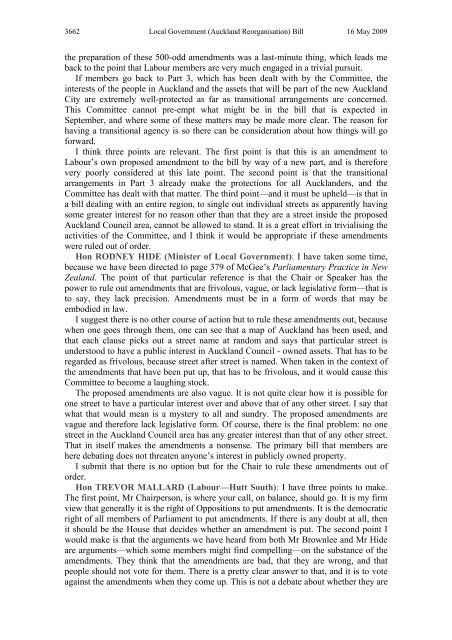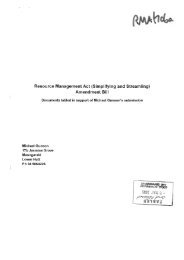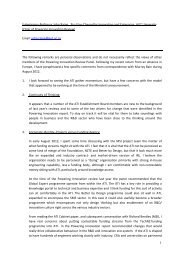Parliamentary Debates (Hansard) - New Zealand Parliament
Parliamentary Debates (Hansard) - New Zealand Parliament
Parliamentary Debates (Hansard) - New Zealand Parliament
Create successful ePaper yourself
Turn your PDF publications into a flip-book with our unique Google optimized e-Paper software.
3662 Local Government (Auckland Reorganisation) Bill 16 May 2009<br />
the preparation of these 500-odd amendments was a last-minute thing, which leads me<br />
back to the point that Labour members are very much engaged in a trivial pursuit.<br />
If members go back to Part 3, which has been dealt with by the Committee, the<br />
interests of the people in Auckland and the assets that will be part of the new Auckland<br />
City are extremely well-protected as far as transitional arrangements are concerned.<br />
This Committee cannot pre-empt what might be in the bill that is expected in<br />
September, and where some of these matters may be made more clear. The reason for<br />
having a transitional agency is so there can be consideration about how things will go<br />
forward.<br />
I think three points are relevant. The first point is that this is an amendment to<br />
Labour’s own proposed amendment to the bill by way of a new part, and is therefore<br />
very poorly considered at this late point. The second point is that the transitional<br />
arrangements in Part 3 already make the protections for all Aucklanders, and the<br />
Committee has dealt with that matter. The third point—and it must be upheld—is that in<br />
a bill dealing with an entire region, to single out individual streets as apparently having<br />
some greater interest for no reason other than that they are a street inside the proposed<br />
Auckland Council area, cannot be allowed to stand. It is a great effort in trivialising the<br />
activities of the Committee, and I think it would be appropriate if these amendments<br />
were ruled out of order.<br />
Hon RODNEY HIDE (Minister of Local Government): I have taken some time,<br />
because we have been directed to page 379 of McGee’s <strong><strong>Parliament</strong>ary</strong> Practice in <strong>New</strong><br />
<strong>Zealand</strong>. The point of that particular reference is that the Chair or Speaker has the<br />
power to rule out amendments that are frivolous, vague, or lack legislative form—that is<br />
to say, they lack precision. Amendments must be in a form of words that may be<br />
embodied in law.<br />
I suggest there is no other course of action but to rule these amendments out, because<br />
when one goes through them, one can see that a map of Auckland has been used, and<br />
that each clause picks out a street name at random and says that particular street is<br />
understood to have a public interest in Auckland Council - owned assets. That has to be<br />
regarded as frivolous, because street after street is named. When taken in the context of<br />
the amendments that have been put up, that has to be frivolous, and it would cause this<br />
Committee to become a laughing stock.<br />
The proposed amendments are also vague. It is not quite clear how it is possible for<br />
one street to have a particular interest over and above that of any other street. I say that<br />
what that would mean is a mystery to all and sundry. The proposed amendments are<br />
vague and therefore lack legislative form. Of course, there is the final problem: no one<br />
street in the Auckland Council area has any greater interest than that of any other street.<br />
That in itself makes the amendments a nonsense. The primary bill that members are<br />
here debating does not threaten anyone’s interest in publicly owned property.<br />
I submit that there is no option but for the Chair to rule these amendments out of<br />
order.<br />
Hon TREVOR MALLARD (Labour—Hutt South): I have three points to make.<br />
The first point, Mr Chairperson, is where your call, on balance, should go. It is my firm<br />
view that generally it is the right of Oppositions to put amendments. It is the democratic<br />
right of all members of <strong>Parliament</strong> to put amendments. If there is any doubt at all, then<br />
it should be the House that decides whether an amendment is put. The second point I<br />
would make is that the arguments we have heard from both Mr Brownlee and Mr Hide<br />
are arguments—which some members might find compelling—on the substance of the<br />
amendments. They think that the amendments are bad, that they are wrong, and that<br />
people should not vote for them. There is a pretty clear answer to that, and it is to vote<br />
against the amendments when they come up. This is not a debate about whether they are






![Full evidence text [PDF 8908k] - New Zealand Parliament](https://img.yumpu.com/14025494/1/184x260/full-evidence-text-pdf-8908k-new-zealand-parliament.jpg?quality=85)
![−3 JUN 2009 IRELEASED] - New Zealand Parliament](https://img.yumpu.com/12829724/1/185x260/3-jun-2009-ireleased-new-zealand-parliament.jpg?quality=85)
![Full paper text [PDF 3515k] - New Zealand Parliament](https://img.yumpu.com/11267192/1/184x260/full-paper-text-pdf-3515k-new-zealand-parliament.jpg?quality=85)


![Full evidence text [PDF 9k] - Parliament](https://img.yumpu.com/7938085/1/184x260/full-evidence-text-pdf-9k-parliament.jpg?quality=85)





